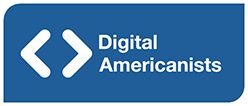Dear past, current, and future members of the Digital Americanists,
Exciting things are happening in the Digital Americanists Society this year! In May a new board was elected at ALA. The new board comprises:
Amanda Gailey, University of Nebraska, President
Matthew Wilkens, University of Notre Dame, Vice-President
Ryan Cordell, St. Norbert College, Secretary/Treasurer
The new board has begun work on several new initiatives. First, we’ve moved the website to UNL, which should give us more flexibility than we had with our previous host. We welcome ideas about how we can make the website more useful to members. If you have suggestions for making the Digital Americanists’ site more than an occasional news venue, please send us an email with your ideas.
Second, we’re working to reach scholars in new venues. The DA will continue to sponsor one or two panels at each year’s American Literature Association Conference—more details about that when the ALA posts its CFP. Next year, however, we’ll also sponsor a panel at the Society for Textual Scholarship’s conference in Austin. Finally, the DA has proposed a roundtable, “Digits, Data, and Dilemmas: Digitization and Knowledge Production in Nineteenth-Century American Literary Studies,” for the C19 Americanists conference in Berkeley. We’re seeking to expand our influence at Americanists gatherings, giving more scholars a chance to present their digital work to more diverse audiences. If you’re interested in organizing a Digital Americanists panel at another conference, please let us know!
In short, we hope to make membership in the Digital Americanists Society more valuable. To help us develop these new initiatives, however, we need you to join the society or renew your membership. Yearly dues are just $10, and we will work to ensure that those dues give members more than warm, fuzzy feelings of civic pride (though warm, fuzzy feelings of civic pride are certainly nice). Visit our membership page for details about how to join or renew your membership. We look forward to working with all of you to further national conversations about technology and American studies.
Please pass this announcement on to anyone you think might be interested in joining the Digital Americanists.
All the best,
Amanda Gailey, amanda.gailey@gmail.com
Matthew Wilkens, mwilkens@nd.edu
Ryan Cordell, rccordell@gmail.com
